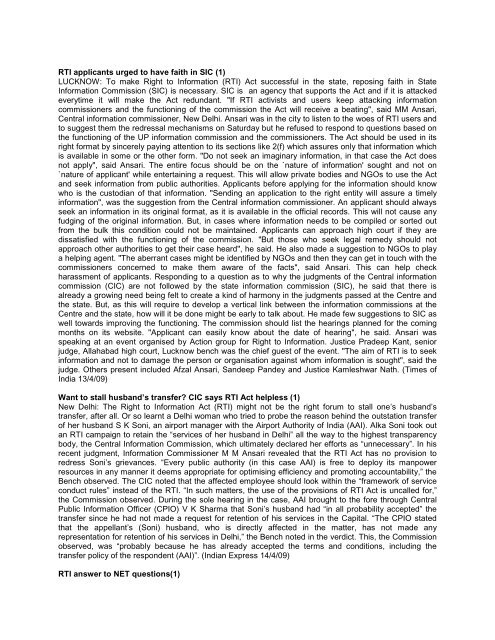RIGHT TO INFORMATION - 2009 - Indian Social Institute
RIGHT TO INFORMATION - 2009 - Indian Social Institute
RIGHT TO INFORMATION - 2009 - Indian Social Institute
Create successful ePaper yourself
Turn your PDF publications into a flip-book with our unique Google optimized e-Paper software.
RTI applicants urged to have faith in SIC (1)<br />
LUCKNOW: To make Right to Information (RTI) Act successful in the state, reposing faith in State<br />
Information Commission (SIC) is necessary. SIC is an agency that supports the Act and if it is attacked<br />
everytime it will make the Act redundant. "If RTI activists and users keep attacking information<br />
commissioners and the functioning of the commission the Act will receive a beating", said MM Ansari,<br />
Central information commissioner, New Delhi. Ansari was in the city to listen to the woes of RTI users and<br />
to suggest them the redressal mechanisms on Saturday but he refused to respond to questions based on<br />
the functioning of the UP information commission and the commissioners. The Act should be used in its<br />
right format by sincerely paying attention to its sections like 2(f) which assures only that information which<br />
is available in some or the other form. "Do not seek an imaginary information, in that case the Act does<br />
not apply", said Ansari. The entire focus should be on the `nature of information' sought and not on<br />
`nature of applicant' while entertaining a request. This will allow private bodies and NGOs to use the Act<br />
and seek information from public authorities. Applicants before applying for the information should know<br />
who is the custodian of that information. "Sending an application to the right entity will assure a timely<br />
information", was the suggestion from the Central information commissioner. An applicant should always<br />
seek an information in its original format, as it is available in the official records. This will not cause any<br />
fudging of the original information. But, in cases where information needs to be compiled or sorted out<br />
from the bulk this condition could not be maintained. Applicants can approach high court if they are<br />
dissatisfied with the functioning of the commission. "But those who seek legal remedy should not<br />
approach other authorities to get their case heard", he said. He also made a suggestion to NGOs to play<br />
a helping agent. "The aberrant cases might be identified by NGOs and then they can get in touch with the<br />
commissioners concerned to make them aware of the facts", said Ansari. This can help check<br />
harassment of applicants. Responding to a question as to why the judgments of the Central information<br />
commission (CIC) are not followed by the state information commission (SIC), he said that there is<br />
already a growing need being felt to create a kind of harmony in the judgments passed at the Centre and<br />
the state. But, as this will require to develop a vertical link between the information commissions at the<br />
Centre and the state, how will it be done might be early to talk about. He made few suggestions to SIC as<br />
well towards improving the functioning. The commission should list the hearings planned for the coming<br />
months on its website. "Applicant can easily know about the date of hearing", he said. Ansari was<br />
speaking at an event organised by Action group for Right to Information. Justice Pradeep Kant, senior<br />
judge, Allahabad high court, Lucknow bench was the chief guest of the event. "The aim of RTI is to seek<br />
information and not to damage the person or organisation against whom information is sought", said the<br />
judge. Others present included Afzal Ansari, Sandeep Pandey and Justice Kamleshwar Nath. (Times of<br />
India 13/4/09)<br />
Want to stall husband’s transfer CIC says RTI Act helpless (1)<br />
New Delhi: The Right to Information Act (RTI) might not be the right forum to stall one’s husband’s<br />
transfer, after all. Or so learnt a Delhi woman who tried to probe the reason behind the outstation transfer<br />
of her husband S K Soni, an airport manager with the Airport Authority of India (AAI). Alka Soni took out<br />
an RTI campaign to retain the “services of her husband in Delhi” all the way to the highest transparency<br />
body, the Central Information Commission, which ultimately declared her efforts as “unnecessary”. In his<br />
recent judgment, Information Commissioner M M Ansari revealed that the RTI Act has no provision to<br />
redress Soni’s grievances. “Every public authority (in this case AAI) is free to deploy its manpower<br />
resources in any manner it deems appropriate for optimising efficiency and promoting accountability,” the<br />
Bench observed. The CIC noted that the affected employee should look within the “framework of service<br />
conduct rules” instead of the RTI. “In such matters, the use of the provisions of RTI Act is uncalled for,”<br />
the Commission observed. During the sole hearing in the case, AAI brought to the fore through Central<br />
Public Information Officer (CPIO) V K Sharma that Soni’s husband had “in all probability accepted” the<br />
transfer since he had not made a request for retention of his services in the Capital. “The CPIO stated<br />
that the appellant’s (Soni) husband, who is directly affected in the matter, has not made any<br />
representation for retention of his services in Delhi,” the Bench noted in the verdict. This, the Commission<br />
observed, was “probably because he has already accepted the terms and conditions, including the<br />
transfer policy of the respondent (AAI)”. (<strong>Indian</strong> Express 14/4/09)<br />
RTI answer to NET questions(1)

















